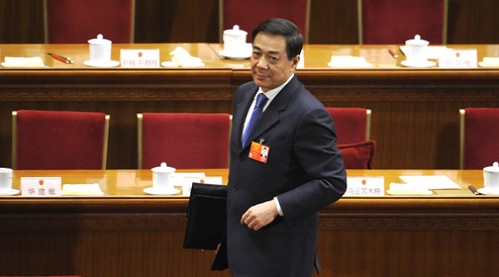
Bo Xilai, former Chinese Communist Party leader in Chongqing province. Mr. Bo was removed from his post at the recently-held National People's Congress. His wife was convicted of murder of a British businessman., a photo by Pan-African News Wire File Photos on Flickr.
September 28, 2012
Ousted From Party in China, Bo Xilai Faces Prosecution
By EDWARD WONG
New York Times
BEIJING — Chinese leaders announced on Friday that Bo Xilai, a disgraced Communist Party aristocrat, had been expelled from the party and would be prosecuted on criminal charges, as the date for the 18th Party Congress, climaxing China’s once-a-decade leadership transition, was scheduled to start on Nov. 8.
The two announcements ended months of speculation over two towering issues: how the party would handle Mr. Bo, the most critical player in the one of the biggest political scandals in decades; and when it would be ready to install a wave of new leaders, including Xi Jinping and Li Keqiang, the men expected to become president and prime minister.
Mr. Bo is accused, among other things, of abusing his power in relation to the case of a British businessman who authorities say was murdered by Mr. Bo’s wife and of taking “massive bribes” directly and through his family, according to Xinhua, the state news agency.
The Xinhua report also made the announcement of the date of the party congress on Nov. 8, a week after the start of a party planning session and two days after the American presidential election.
The most watched part of the transition will be the announcement of who will get seats on the Politburo Standing Committee, the elite body that governs China by consensus and whose membership could be reduced to seven from nine this year.
Political insiders said the decisions over how to move ahead on dealing with Mr. Bo and the timing of the party congress were linked, because the Bo issue had to be settled to a certain degree before the leadership transition could take place.
The son of one of China’s revered revolutionary leaders, Mr. Bo, 63, the former party chief of the southwest metropolis of Chongqing, was one of the most powerful politicians in China and considered a contender for the standing committee before investigators began looking early this year into the killing of Neil Heywood, a British citizen.
Gu Kailai, Mr. Bo’s wife, was convicted last month of murdering Mr. Heywood by poisoning and given a suspended death sentence, which means she will likely serve a long prison term, possibly life.
The announcements came after a Politburo meeting here in Beijing on Friday. A weeklong national holiday is to start in China on Sunday, and many people had expected news on either Mr. Bo’s fate or the party congress before then. Officials in Chongqing began getting word of the move against Mr. Bo on Friday afternoon.
The Xinhua report had a long list of accusations against Mr. Bo. The most serious appeared to be those relating to bribes and the Heywood murder, though no specific information was given.
The report said he violated party discipline for many years, starting with posts in the city of Dalian and Liaoning Province, continuing during a stint as commerce minister, and extending through his four-year governance of Chongqing, where he was known for a so-called anticorruption crackdown and a revival of Mao-era patriotic songs through public singalongs.
The report also said investigators found Mr. Bo had “inappropriate sexual relationships with multiple women,” without giving names. Ms. Gu was also accused of taking bribes.
The public airing of such serious and sordid charges showed that party leaders had reached agreement that Mr. Bo had to be dealt with severely. Mr. Bo was a charismatic leader who, using his platform in Chongqing, had espoused populist policies and gathered an ardent following, especially among believers of a leftist revival where the state would impose economic equality.
It is unclear when a criminal trial for Mr. Bo would begin. Mr. Bo has been detained since March, when he was dismissed from his party chief position. He was suspended from the Politburo the following month. The state news media said Mr. Bo was under investigation for “serious disciplinary violations.”
Li Zhuang, a lawyer who served an 18-month prison sentence in Chongqing during Mr. Bo’s crackdown after being found guilty of suborning perjury, welcomed the announcement of the accusations against Mr. Bo.
Mr. Li’s case inspired an outcry among Chinese liberals, who accused Mr. Bo and police officers in Chongqing of taking aim at civilians who had nothing to do with organized crime.
“This is great news, but also quite expected,” Mr. Li said in a telephone interview. “This is how things should be.”
Mr. Li said he had been in Chongqing recently speaking with family members of people convicted during the crackdown.
“Now that Bo has been expelled from the Communist Party,” he said, “there’s more hope for them to get justice.”
Jonathan Ansfield contributed reporting. Mia Li and Shi Da contributed research.
No comments:
Post a Comment